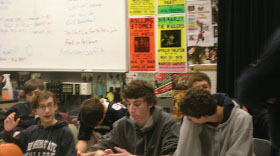A crowd of students is congregated around two tables pushed together in the center of the room. The general murmur of talking dies down as teacher Jim Honeycutt begins to speak, and the students attentively listen to the day’s agenda. Today they will be continuing work filming and editing the stories they began work on last class.
The TV Production classes at Staples High School aim to teach students about the inner workings of a news television show while also informing the student body about

local current events and issues. The classes are taught by Jim Honeycutt and Mike Zito during two different class periods. “It’s a sometimes difficult class because there are so many different people,” Zito said.
Each class produces a show of Good Morning Staples once a week, one on Tuesday and one on Thursday. “Good Morning Staples” is designed to inform students about goings on around the school, such as club and sports updates. The show has also been known to create public service announcements in an effort to improve the school, such as on the proper usage of a free period.
The first step before every show is the brainstorming. The students talk together in the classroom about upcoming news that needs to be covered and stories that need to be told. The final ideas get written down on the large whiteboard in the back of the room next to the name of the students writing them. This whiteboard is crucial for organizational purposes. As there are two classes, it is imperative that two students do not accidentally begin working on the same story. The whiteboard prevents this potential overlap.
After brainstorming with the class, the students research, film, and edit their stories to be prepared for the show. “Monday we’ll actually put the show together—Wednesdays we’ll watch the show and critique it,” Zito said. “Our goal really is to try and present stories from all over the school. The hardest part is getting them and getting the stories.”
The process of filming varies, but most students agree that it is their favorite part of the class. They can either stage a segment to create knowledge for a public announcement, or they can go around to the students of the school to gain public opinion about current issues.
“We like to try to get the entire student body involved,” Zito said.
In an attempt to encourage ideas from the student body for the show, Zito and Honeycutt have created a link for the submission of ideas on the Staples High School website. They also try to encourage as much student participation the shows themselves as possible. Jake Shore ’13 is not in the TV Production class, but has an interest in film. “I’ve worked with Mr. Micinilio for the morning show doing a video about lockers, and normally I just edit videos at random,” Shore said.
Primarily, the class is an opportunity for students seriously interested in media production. Charlie Greenwald ’11 is particularly interested in talk shows. “If I get involved in them through hosting or writing, I’d be perfectly happy doing either,” Greenwald said. “But obviously, I’m too good looking not to be a host.”
Greenwald also commented on the changes of the class in recent years. “The class has been reshaped over the years, as it has become much more about news and less about entertainment,” Greenwald said.
Zito admits that there are sometimes conflicting opinions about the direction of the show. “We have almost an impossible job in that a lot of kids around the school would like it to be a comedy show, and be funnier. And teachers want it a certain way, and administrators want it a certain way,” Zito said. Zito and Honeycutt would prefer that the show focus on its goal to be a helpful informant to the student body, rather than solely a source of entertainment.
Another area of conflict the show is often faced with is what to film. As each class is only given a few minutes of airtime each week, they must be extremely selective in what they choose to produce. “It’s somewhat restricted by what the kids want to film,” Zito said. In terms of his own selection, Zito said, “The football team’s going to get the press…but some of the less popular teams, I think it’s almost more important that we put their info on.”
Despite the conflicts, the TV Production classes continually succeed at producing an informative and entertaining show.













































